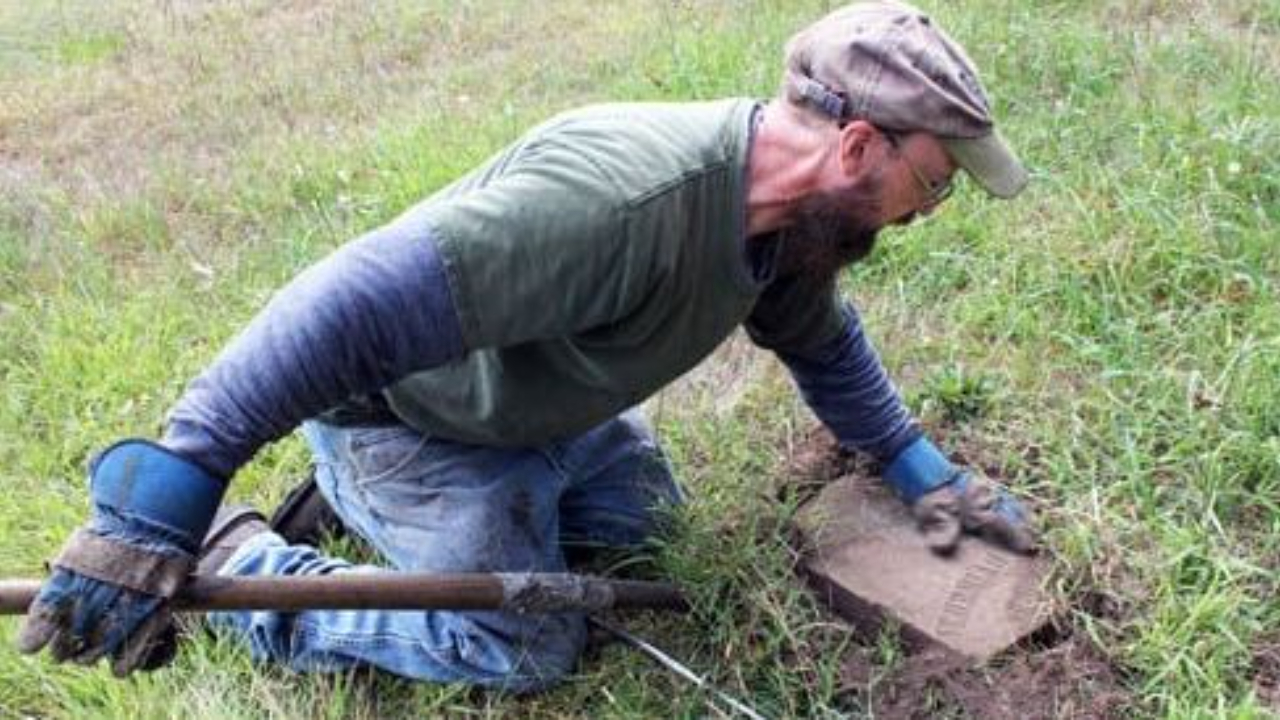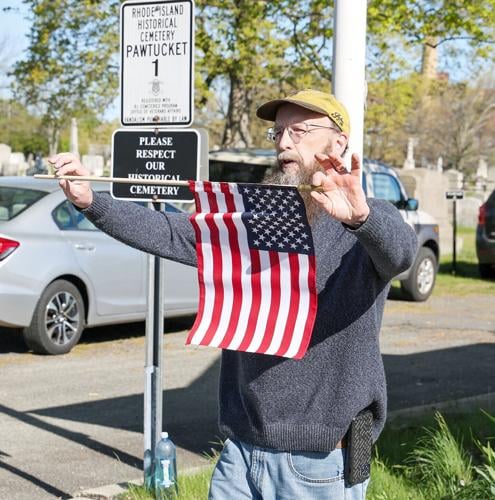
Church Revitalization in Historical New England - The Cemetery Pastor's Guide to Intentional Evangelism: Spotlight: Ken Postle
New England churches face a documented crisis. Church attendance in the region stands as the lowest in the nation, with New Hampshire (24%), Vermont (24%), Rhode Island (28%), Massachusetts (31%), and Maine (31%) reporting the most dramatic declines.¹ Empty pews stretch across sanctuaries that once overflowed with faithful congregations. Historic steeples pierce the sky over communities where church membership has fallen below 50% nationally for the first time in recorded history.² But what if the key to revitalization lies not in modern marketing strategies or contemporary worship formats, but in the very soil beneath our feet?
Meet Ken Postle, the "Cemetery Pastor" whose unconventional approach to evangelism is breathing new life into both forgotten graveyards and forgotten faith. In 2010, during a time of widespread unemployment, Ken Postle assembled a group of twelve teenagers through a city grant to restore a Civil War cemetery that had become a dumping ground for abandoned cars. What began as a community service project evolved into something far more profound—a masterclass in intentional evangelism that every pastor should study.
Ken Postle's battle with city officials over the misappropriation of perpetual care funds thrust him into the public eye. The media attention that followed his restoration efforts exposed decades of corruption, but it also opened doors that no traditional church outreach program could have unlocked. The State cemetery chair offered training and support. Donations poured in from unexpected sources. The Blackstone Valley Historical Society invited him to speak, leading to presentations in dozens of classrooms, award ceremonies, and speaking events across the region.
This wasn't an accident—this was intentional evangelism in action.
Through cemetery restoration, Ken Postle has worked in over 100 different cemeteries and discovered a dozen lost burial grounds and hundreds of forgotten headstones. He has uncovered unknown veterans, Native American burial sites, and historical treasures that tell the story of faith in early America. More importantly, he has worked with over 1,000 school children and Scout groups, using flag placement ceremonies to share the Gospel through abolitionist history and resurrection hope. Research shows that engaging youth in preservation work creates lasting connections to cultural heritage and community values.³
Ken Postle's approach centers on a simple yet profound truth: early Protestant settlers in Rhode Island faced their dead eastward, aligned to rise when Christ returns from the east to the west. This physical expression of resurrection faith naturally serves as a bridge to Gospel conversations with academics, reporters, and community members who might never step inside a church building.
The breadth of Ken Postle's evangelistic reach proves remarkable. He has worked alongside Mormon groups at forgotten cemeteries, engaging bishops and members in resurrection conversations while directing their restoration work. His cemetery projects have created natural dialogue opportunities with Wiccans, atheists, Buddhists, journalists, and paranormal investigators—people who would never engage with pastors in traditional church settings. The neutral ground of historical preservation breaks down barriers that conventional evangelism cannot penetrate.
Three Principles for Pastors Pursuing Intentional Evangelism
- Meet People in Their Hunger for Purpose
Ken Postle discovered that flagging veterans' graves brings out people with a deep desire to do what's right. This fertile soil of civic duty and honor creates natural opportunities for spiritual conversations. Research confirms that 62% of unchurched Americans would attend community service events sponsored by local churches, making it the most effective outreach method.⁴ Pastors must identify where their communities hunger for meaning and step into those spaces. Whether it's historical preservation, community service, or social justice, find where people yearn to make a difference and meet them there with the Gospel.
- Engage the Unexpected Audience
The cemetery pastor thrives on engaging academics, reporters, and diverse religious communities—people who might dismiss traditional evangelism but respect authentic expertise and passion. Ken Postle's work has opened doors to Gospel conversations with Mormon bishops, Wiccan practitioners, atheist historians, Buddhist meditation groups, paranormal investigators, and secular journalists. Studies show that 47% of unchurched Americans are willing to discuss religious beliefs freely with someone who demonstrates genuine competence in their field.⁵ When you become known for something valuable beyond church walls, you earn the right to speak into lives that seemed unreachable. Develop competence in areas that matter to your community. Become the person others seek out for wisdom, not just religious answers.
- Use Public Prayer as an Evangelistic Tool
Ken Postle advocates that every pastor should offer public prayers and engage in the "fertile landscape of the dead." Public prayer breaks down barriers between sacred and secular spaces. It demonstrates faith in action rather than just faith in words. When pastors pray over community projects, historical sites, or civic events, they normalize spiritual conversation in spaces where Christ's name might otherwise remain unspoken.
The Gospel in the Graveyard
Cemetery evangelism works because death strips away pretense. Among weathered headstones and faded inscriptions, eternal questions surface. The Gospel message, carved in stone, becomes impossible to ignore. Early American graveyards overflow with Scripture verses, resurrection symbols, and testimonies of faith that create natural talking points for spiritual conversations.
Cemeteries represent a vast untapped resource—covering two million acres of U.S. soil with enormous potential for community engagement and spiritual dialogue.⁶ Research demonstrates that cemeteries serve multiple functions beyond burial, offering spiritual restoration, community gathering spaces, and historical education opportunities that create natural bridges for evangelistic conversations.⁷
Ken Postle's work demonstrates that church revitalization doesn't require abandoning historical roots—it requires rediscovering them. New England's spiritual heritage lies buried beneath centuries of accumulated secularism, waiting for pastors brave enough to dig it up and dust it off.
The Statistical Reality of Evangelism
Current data reveals a sobering truth about evangelism in American churches. More than half (55%) of Protestant churchgoers have not shared how to become a Christian with someone in the past six months, despite 56% praying for evangelistic opportunities at least weekly.⁸ Only 10% of churchgoers average one evangelistic conversation per month.⁹ Yet community engagement provides a powerful solution: 51% of unchurched Americans would attend community service projects organized by churches, making it more effective than traditional worship invitations (35%).¹⁰
Moving Forward
The cemetery pastor's model challenges traditional evangelism assumptions. Instead of asking people to come to church, Ken Postle brings the Gospel to them. Instead of competing with secular interests, he collaborates with historical societies and civic organizations. Instead of avoiding difficult conversations about corruption and injustice, he confronts them head-on with Gospel truth.
Church revitalization in New England requires pastors who think like archaeologists—people willing to excavate the spiritual treasures buried in their communities' past and present them with fresh relevance to contemporary audiences. The harvest field isn't dead; it's just waiting for someone bold enough to plant flags of faith where others see only forgotten ground.
Ken Postle proves that intentional evangelism creates opportunities that traditional church growth strategies miss. When pastors engage their communities with authentic service, expert knowledge, and bold faith, even the dead can rise again.
Footnotes
- Gallup, "Church Attendance Lowest in New England, Highest in South," April 2021. Based on 68,031 interviews conducted 2004-2006.
https://news.gallup.com/poll/22579/church-attendance-lowest-new-england-highest-south.aspx - Gallup, "U.S. Church Membership Falls Below Majority for First Time," March 2025. First time church membership has fallen below 50% since measurement began.
https://news.gallup.com/poll/341963/church-membership-falls-below-majority-first-time.aspx - "Assessing Youth Engagement in the Preservation and Promotion of Culture Heritage: A Case Study in Korça City, Albania," March 2021. Study of 384 youth across 21 cities demonstrates high knowledge and positive attitudes toward heritage preservation.
https://www.researchgate.net/publication/350785190_Assessing_Youth_Engagement_in_the_Preservation_and_Promotion_of_Culture_Heritage_A_Case_Study_in_Korca_City_Albania - Lifeway Research, "9 Types of Effective Evangelism and Church Invitations," May 2023. Study of unchurched Americans' receptiveness to various church outreach methods.
https://research.lifeway.com/2019/05/22/9-types-of-effective-evangelism-and-church-invitations/ - Lifeway Research, "9 Types of Effective Evangelism and Church Invitations," May 2023. Survey finding 47% of unchurched Americans willing to discuss religious beliefs freely.
https://research.lifeway.com/2019/05/22/9-types-of-effective-evangelism-and-church-invitations/ - Smithsonian Folklife Magazine, "The Potential of Our Decay: Cemeteries That Save the American Landscape," 2023. Analysis showing cemeteries cover two million acres of U.S. soil.
https://folklife.si.edu/magazine/cemeteries-burials-american-landscape - ScienceDirect, "Cemeteries as public urban green space: Management, funding and form," March 2021. Research on multifunctional use of cemetery spaces for community engagement.
https://www.sciencedirect.com/science/article/abs/pii/S1618866721001035 - Lifeway Research, "Evangelism More Prayed for Than Practiced by Churchgoers," July 2021. Discipleship Pathway Assessment study showing 55% of Protestant churchgoers haven't shared how to become a Christian in past six months.
https://lifewayresearch.com/2019/04/23/evangelism-more-prayed-for-than-practiced-by-churchgoers/ - Lifeway Research, "Evangelism More Prayed for Than Practiced by Churchgoers," July 2021. Study finding only 1 in 10 churchgoers average at least one evangelistic conversation monthly.
https://lifewayresearch.com/2019/04/23/evangelism-more-prayed-for-than-practiced-by-churchgoers/ - Lifeway Research, "9 Types of Effective Evangelism and Church Invitations," May 2023. Data showing 51% would attend community service projects vs 35% willing to attend worship services.
https://research.lifeway.com/2019/05/22/9-types-of-effective-evangelism-and-church-invitations/
Gain access to over $500.00 worth of free resources to help you grow and think towards vitality. A free resource to help encourage and equip you and your church towards revitalization and renewal. It's simple, sign up, and it is free.
Stay connected with news and updates!
Join our mailing list to receive the latest news and updates from our team.
Don't worry, your information will not be shared.
We hate SPAM. We will never sell your information, for any reason.

